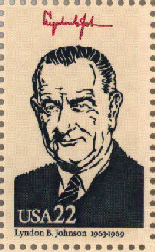 Lyndon Baines Johnson was born in Texas with a rural background. He was 55 years
old when he took the oath as president of the United States after
John F. Kennedy's tragic death in Dallas on 22 November 1963.
Lyndon Baines Johnson was born in Texas with a rural background. He was 55 years
old when he took the oath as president of the United States after
John F. Kennedy's tragic death in Dallas on 22 November 1963.
*** Quote ***
 Lyndon Baines Johnson was born in Texas with a rural background. He was 55 years
old when he took the oath as president of the United States after
John F. Kennedy's tragic death in Dallas on 22 November 1963.
Lyndon Baines Johnson was born in Texas with a rural background. He was 55 years
old when he took the oath as president of the United States after
John F. Kennedy's tragic death in Dallas on 22 November 1963.
His career started in the 1930s as an aide to a Texas congressman, then as the director of the New Deal's National Youth Administration in Texas. In 1936 he became a congressman with close personal ties to Franklin Delano Roosevelt . In 1948 he became senator. He campaigned to become the Democratic party's nominee for the presidency in 1960. However, the Democratic convention chose John F. Kennedy as the Democratic nominee and Johnson became Kennedy's Vice-president.
When Kennedy was assassinated, Johnson had twenty-six years of political experience and was ready for the job as 36th president of the United States of America.
LBJ established domestic politics as his first priority and declared that he would follow JFK's programs. Civil rights and a 'war on poverty' were two of his biggest issues and were in the tradition of the New Deal. After his landslide victory in the 1964 election he introduced his brainchild 'Great Society', which initiatives aimed at improving the health, nutrition and education of (poor) Americans. The ambitious Great Society had its greatest successes in its first years, notably the Civil Rights Act of 1964, which outlawed racial discrimination in public accommodations and the Voting Rights Act of 1965, which ensured the right to vote for all.
At the foreign front things did not go as smoothly, however. As time proceeded, LBJ and his administration got increasingly caught up in an ever growing quagmire in Vietnam. His decision to 'Americanize' the war in Vietnam meant an ever growing number of American soldiers in South East Asia. At the time, however, the growing American involvement in Vietnam was not seen as ludicrous, for it was very much in line with the foreign policy principles pursued by all American presidents after WWII based on the principle of 'containment' as articulated in the Truman Doctrine. Johnson believed that it was America's duty to be involved in Vietnam in order to prevent it from falling to communism -in other words: to prevent North Vietnam and the Viet Cong (VC) from winning. As the war progressed, opposition to the growing involvement, the increasing amount of casualties and destruction mounted.
After the Tet-offensive, on January 31 1968, LBJ's popularity was at an all-time low. On March 31 of that same year he appeared on national television announcing that the bombing of North Vietnam would come to an end -except for the parts close to the DMZ. The war in Vietnam had left Lyndon Johnson broken. In that same speech he made public his decision not to run again for the United States Presidency. He left the political scene and died a few years later. LBJ would go into history as the man who dragged America into the Vietnam war, as a racist fighting a racist war. Despite his ambitious Great Society, which certainly had been successful, especially in its early years, Johnson's name would forever be associated with the disaster in Vietnam.